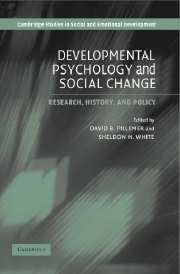Book contents
- Frontmatter
- Contents
- Preface
- List of Contributors
- Introduction: What Kind of Science Is Developmental Psychology?
- Part One The Developing Child: Global and Historical Perspectives
- Part Two Designing Child and Family Policies
- 4 The Effects of Welfare Reform and Poverty Policies on Children and Families
- 5 The Disconnect between Research and Policy on Child Care
- 6 Child Development and Child-Care Policy: Modest Impacts
- Part Three Designing Child Health Policies
- Part Four Designing Effective Learning Environments for Children and Adolescents
- Index
- References
6 - Child Development and Child-Care Policy: Modest Impacts
Published online by Cambridge University Press: 03 December 2009
- Frontmatter
- Contents
- Preface
- List of Contributors
- Introduction: What Kind of Science Is Developmental Psychology?
- Part One The Developing Child: Global and Historical Perspectives
- Part Two Designing Child and Family Policies
- 4 The Effects of Welfare Reform and Poverty Policies on Children and Families
- 5 The Disconnect between Research and Policy on Child Care
- 6 Child Development and Child-Care Policy: Modest Impacts
- Part Three Designing Child Health Policies
- Part Four Designing Effective Learning Environments for Children and Adolescents
- Index
- References
Summary
Whether developmental scientists have had an impact on the nation's day-care and preschool education policy is an important issue for several reasons. Social science research in general, and child development research in particular, is funded primarily by the federal government and foundations. Although I do not want to get entwined in the argument about the payoffs from basic versus applied research, there is little question that the federal government and foundations invest in child development research because they are seeking improved development of poor children, especially as measured by better academic performance in the schools. It follows that a major test of the validity of research-generated knowledge about development is whether knowledge can provide guidance for intervention programs designed to improve development, especially of poor children. An equally important issue is whether social scientists have learned to use their knowledge to influence policymakers as they formulate the nation's policy on day-care and preschool programs.
To examine the impact of child development research and researchers on the formulation of day-care and preschool policy, I adopt a straightforward approach. At the risk of some simplification, the historical record of the development of federal policy for day-care and preschool programs is divided into five episodes: the creation of Head Start in 1965; the battle over federal regulations as represented by the Federal Interagency Day Care Requirements (FIDCR); enactment of the Family Support Act of 1988; enactment of the pivotal child-care legislation of 1990; and the mega battle over the 1996 welfare reform legislation.
- Type
- Chapter
- Information
- Developmental Psychology and Social ChangeResearch, History and Policy, pp. 140 - 170Publisher: Cambridge University PressPrint publication year: 2005
References
- 1
- Cited by

